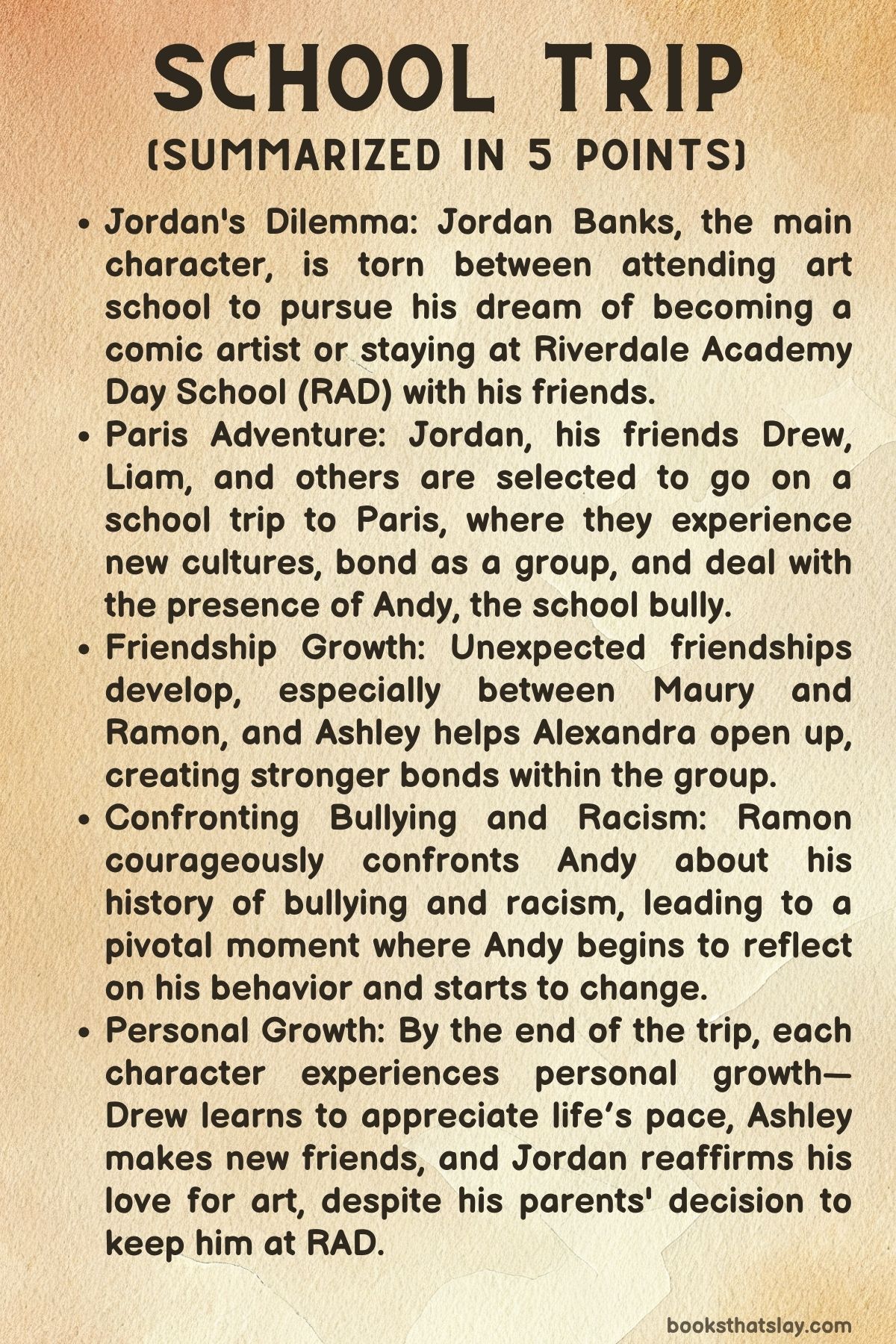School Trip by Jerry Craft Summary, Characters and Themes
School Trip is a graphic novel by Jerry Craft, released in 2023 as the third installment in his highly regarded series that started with New Kid and Class Act. The novel continues to explore the experiences of Jordan Banks, a young middle schooler navigating life at Riverdale Academy Day School (RAD).
This time, Jordan and his friends embark on an adventure to Paris, where they confront new challenges, deepen their friendships, and tackle important topics like bullying and racism. With humor and heart, School Trip brings to life the complexities of growing up and embracing change.
Summary
In School Trip, Jordan Banks faces a significant decision about his future—whether to follow his dream of becoming a comic artist by attending art school or stay at Riverdale Academy Day School (RAD) with his friends.
While he’s unsure of what path to take, he’s soon distracted by exciting news: Jordan, along with his best friends Drew Ellis and Liam Landers, have been chosen to go on a school trip to Paris.
Their classmates Ramon, Maury, Alexandra, Ashley, Samira, and even Andy, the class bully, are also on the list, which dampens their enthusiasm slightly. Ashley, in particular, feels down because her close friend Ruby won’t be joining them.
Before leaving, Jordan, Drew, Liam, and Maury have a sleepover at Liam’s house, where they realize they don’t know much about Maury’s life except that he comes from a very wealthy background.
When they land in Paris, Jordan is worried that Andy might pick on Ramon, so he volunteers to be Andy’s roommate to protect his friend.
Meanwhile, Maury and Ramon share a room and quickly start forming an unexpected friendship. Drew and Liam are paired up, and the girls—Ashley, Alexandra, and Samira—stay together, with Ashley trying to strike up a friendship with Alexandra, despite her preference for solitude.
The beauty of Paris overwhelms the group, from the food to the city’s elegant architecture, which feels a world apart from New York. However, a major hurdle arises when the teachers’ credit cards fail to work in Paris.
Maury steps in to save the day, offering to cover the expenses using his own card. With Maury acting as the unofficial leader, guiding them through the city, he becomes more connected with his classmates, particularly Jordan, Drew, and Ramon.
Meanwhile, Ashley’s persistence pays off as Alexandra begins to open up to her, forming a new friendship.
Andy, however, refuses to fully embrace the Parisian culture, and his continued mocking behavior causes tension within the group.
It reaches a boiling point one evening when Ramon confronts Andy, expressing how Andy’s bullying has hurt him, particularly its racist undertones.
Andy reacts by storming off, feeling alienated. The next day, Drew has a heart-to-heart with Andy, helping him see that his actions were harmful, even if Andy didn’t view them that way.
Drew explains the difficulties Black people face, encouraging Andy to consider other people’s perspectives more deeply.
By the trip’s end, each character has grown in some way. Drew learns to appreciate taking life more slowly, Ashley forges new connections, and Jordan reaffirms his passion for art.
Andy, in a surprising twist, apologizes to Ramon, starting to show signs of change.
Once back at RAD, life resumes with some notable differences. Andy makes a genuine effort to change, and Maury and Ramon’s unlikely friendship catches people’s attention.
Although Jordan is disappointed when his parents decide against letting him attend art school, he finds comfort in knowing he’ll remain with his friends. The novel concludes with the group more united than ever, ready to improve their school community.

Characters
Jordan Banks
Jordan, the central character and narrator, is a talented young artist who grapples with his future aspirations and the emotional complexities of growing up. He is torn between pursuing his passion for art by attending an art school or staying at Riverdale Academy Day School (RAD) with his close friends.
This internal conflict reflects his deeper anxieties about change and separation. Throughout the novel, Jordan also emerges as a compassionate and mature figure, as demonstrated when he volunteers to room with Andy to protect Ramon from Andy’s bullying.
Jordan’s friendship with Drew and Liam deepens through the trip. His love for art is reaffirmed by the experiences in Paris, even as he faces the disappointment of his parents’ decision not to allow him to attend art school.
Jordan’s character arc shows growth in terms of self-awareness, empathy, and resilience in the face of difficult choices.
Drew Ellis
Drew is Jordan’s best friend, a bright, thoughtful, and outspoken student who often feels the pressures of being a Black student in a predominantly white school. Throughout School Trip, Drew continues to grapple with issues of race and privilege.
He is perceptive, particularly when he talks to Andy about racism and challenges him to understand the experiences of Black people. Drew’s conversation with Andy is a pivotal moment in the novel, as it highlights his emotional maturity and willingness to stand up for what he believes in.
Additionally, Drew’s friendship with Jordan remains strong. He too is transformed by the trip, learning to appreciate the importance of slowing down and enjoying life’s moments.
Drew’s sensitivity to others’ experiences makes him an empathetic and relatable character.
Liam Landers
Liam is another one of Jordan’s closest friends, hailing from a wealthy family, yet he is often self-conscious about his privileged background. In the novel, Liam provides emotional support to his friends, including during the sleepover at his house before the Paris trip.
Though he doesn’t take a central role in confronting the school’s racial dynamics, his character shows the importance of solidarity and friendship. His shared room with Drew during the trip fosters more bonding between the two, helping both boys understand each other better.
Liam, like Jordan, grows throughout the trip by developing a greater sense of empathy and appreciating the value of his friends.
Maury
Maury is initially a somewhat enigmatic figure, known mostly for his affluent upbringing. However, in Paris, his character is fleshed out as he steps up to cover expenses when the teachers’ credit cards fail.
Maury becomes a leader in the group, using his knowledge of Paris to guide his classmates and demonstrate his generosity. His friendship with Ramon blossoms as he treats him to room service and helps him navigate the trip.
Maury also bonds with Drew and Jordan, revealing that despite his privileged background, he shares common ground with them. Maury’s growth lies in his ability to form genuine friendships and challenge preconceived notions about himself and others.
Ramon
Ramon, who has been a target of Andy’s bullying, is a quiet and reserved student who gains strength and confidence throughout the trip. His confrontation with Andy is one of the most emotionally charged moments in the novel.
Ramon’s brave acknowledgment of the racism and trauma he has faced due to Andy’s bullying showcases his courage and desire for justice. Over the course of the trip, Ramon not only becomes close with Maury but also learns to advocate for himself and stand up to his bully.
By the end of the novel, his friendship with Maury defies expectations, highlighting the possibility of growth and reconciliation.
Andy
Andy, the school bully, starts as an antagonist in the story but undergoes significant development. At the beginning of the trip, Andy continues to mock and belittle others, refusing to embrace the culture and differences he encounters in Paris.
However, after Ramon’s confrontation and Drew’s talk, Andy is forced to reflect on his actions and their racist underpinnings. His initial defensiveness and denial about being racist are characteristic of someone who hasn’t fully understood his privilege or the impact of his behavior.
By the end of the novel, Andy takes accountability for his actions by apologizing to Ramon, signifying a step towards personal growth. His transformation, though gradual, suggests that change is possible with self-awareness and empathy.
Ashley
Ashley’s character arc revolves around her feelings of loneliness due to the absence of her best friend, Ruby, and her attempts to make new connections. Her initial anxiety during the trip is focused on staying in touch with Ruby, but as the days pass, she manages to build a friendship with Alexandra, who prefers her own company.
Ashley’s persistence in trying to connect with others pays off, as she learns that friendship can come in unexpected places. Her personal growth is reflected in her newfound confidence and ability to form meaningful bonds outside her usual circle.
Alexandra
Alexandra is a somewhat reclusive character who prefers solitude. Throughout the trip, she gradually opens up to Ashley’s attempts at friendship.
Though she starts off as distant and seemingly uninterested in connecting with others, Alexandra’s slow transformation demonstrates how stepping out of one’s comfort zone can lead to new relationships. Her friendship with Ashley highlights the theme of personal growth through vulnerability and connection.
Teachers and Chaperones
While not as central as the students, the teachers and chaperones on the trip play a key role in guiding the students through their experiences. They represent authority and responsibility but also serve as a reminder that adults, too, can make mistakes (as seen when their credit cards don’t work).
Sometimes, students like Maury must step up to take charge.
Characters
Navigating Cultural Differences and the Growth of Empathy
One of the most significant themes in School Trip is the exploration of cultural differences, particularly through the lens of the Paris trip. The story emphasizes the various ways in which the students encounter new experiences, from unfamiliar cuisine and architecture to the slower pace of life in Paris, which contrasts with their New York City upbringing.
These encounters are not just superficial; they challenge the characters to rethink their preconceived notions and confront their biases. For instance, Andy’s initial resistance to French culture—his discomfort with the food, language, and customs—mirrors a larger struggle with embracing difference.
Over the course of the trip, other characters, particularly Drew, engage Andy in conversations that urge him to consider perspectives beyond his own. This evolving dynamic allows Andy to eventually confront his racism, a form of cultural difference embedded in his own prejudices.
The novel underscores that personal growth often stems from being open to new cultures and that empathy is crucial in bridging differences, whether cultural or racial.
The Intersection of Privilege, Class, and Social Bonds
Craft deftly weaves the theme of privilege and class disparity into the novel, most notably through the character of Maury. As a wealthy student, Maury’s ability to use his credit card to cover expenses when the teachers’ cards fail illustrates the ease with which privilege can solve problems that others may find insurmountable.
However, School Trip complicates this dynamic by showing that Maury’s wealth does not exempt him from the need for authentic social connections. Initially perceived as aloof due to his wealth, Maury gradually reveals his own vulnerabilities, particularly in how he uses his financial resources not to flaunt power but to foster camaraderie.
The trip acts as a catalyst for Maury’s deeper integration into the group. It shows that while class differences can create initial barriers, they can be overcome through shared experiences and mutual respect.
By emphasizing how social bonds transcend material wealth, Craft explores the nuanced ways privilege operates within friendships and how empathy and shared experiences can dismantle the divisions class often creates.
Racial Identity, Prejudice, and the Complexity of Microaggressions
Racial identity and the nuanced forms of prejudice that students of color face are core themes in School Trip. Drew’s conversation with Andy, in which he confronts Andy’s denial of his own racism, brings to light the complex realities of being Black in a predominantly white institution.
The novel delves into the subtleties of racism, particularly through the lens of microaggressions. Andy’s bullying of Ramon is not just a case of general schoolyard teasing, but a reflection of deeper racialized behavior.
Drew’s discussion about how Black people often have to navigate a world filled with prejudice expands this theme. It shows that racism isn’t always overt or intentional, but can manifest in unexamined assumptions and behaviors.
Through Drew’s insistence that Andy try to understand the lived experiences of Black students like him and Ramon, the novel offers a sophisticated examination of how ignorance and privilege intersect with racial identity. The eventual reconciliation between Andy and Ramon underscores that confronting racial prejudice requires active engagement, reflection, and a willingness to change.
The Conflict Between Personal Aspirations and Parental Expectations
Jordan’s internal struggle over whether to attend art school or remain at Riverdale Academy Day School introduces a layered theme about the tension between personal aspirations and familial expectations. Jordan’s passion for becoming a comic artist is evident throughout the novel, but this dream is curtailed when his parents express doubt about the viability of such a career, particularly for a young Black artist.
This conflict speaks to a broader theme of generational pressure and the barriers that parents—often from marginalized communities—impose on their children’s dreams due to practical concerns about stability and success in a world that remains inequitable.
Jordan’s frustration reflects a universal struggle: the desire for self-fulfillment versus the pressure to conform to more traditional, ‘safe’ paths. Craft illustrates that this tension is not a simple matter of rebellion or obedience but a more profound issue about identity, self-worth, and the ways marginalized youth are often discouraged from pursuing creative fields due to systemic barriers.
This theme also critiques societal norms that undervalue artistic and creative careers, particularly for people of color. It shows how such expectations can stifle individuality and passion.
Transformation Through Vulnerability and Emotional Accountability
An important thread in School Trip is the theme of emotional growth through vulnerability. Characters are forced to confront their personal weaknesses and assumptions.
The turning point for many of the characters comes when they allow themselves to be vulnerable in front of others. Ramon’s decision to confront Andy about the impact of his bullying is not just an act of bravery, but one of emotional honesty, forcing Andy to reckon with the harm he’s caused.
This moment underscores how personal transformation is often linked to emotional accountability. Similarly, Maury’s shift from a somewhat distant figure to a more integral part of the group occurs when he opens up to Drew, Jordan, and Ramon, moving beyond the superficial connections often dictated by class differences.
Even Andy, who initially resists change, finds himself isolated and forced to confront his role in his own alienation. This theme suggests that personal growth and community-building require not only acknowledging one’s mistakes but also embracing the discomfort that comes with vulnerability.
In the end, these moments of openness allow the characters to build deeper, more genuine relationships with one another. Real transformation is rooted in emotional risk-taking and accountability.
The Power of Friendship in Redefining Identity and Belonging
At its core, School Trip is a narrative about the transformative power of friendship and how it can redefine one’s sense of identity and belonging. Jordan’s central conflict about whether to stay at RAD or pursue art school reflects a larger question of where he feels he fits in.
His bond with Drew, Liam, and the others provides him with a sense of belonging that transcends the external pressures he faces regarding his future. The friendships in the novel are not merely supportive; they act as mirrors that help each character see themselves more clearly.
For instance, Drew’s ability to articulate the realities of racism to Andy stems from his confidence in his own identity, a confidence bolstered by his friendships. The novel suggests that true friendship is not about avoiding conflict or difference but about facing those challenges head-on and emerging stronger.
Through their shared experiences in Paris, the group forms a collective identity that is more inclusive and understanding than the individual identities they each carried at the start of the story. In this sense, friendship becomes a powerful tool for personal and communal transformation, offering the characters a way to redefine themselves and the world around them.


